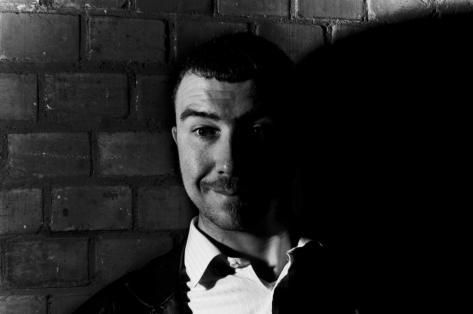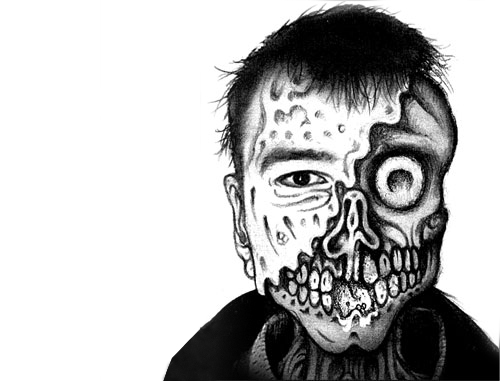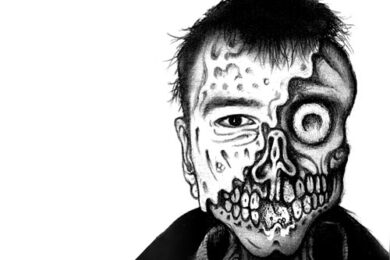Sam Shackleton’s entry into the world of electronic music was through visits to dubstep’s chrysalis, FWD>>, in the early 2000s. Along with a cohort of friends, among them Laurie Appleblim, the Lancashire-born producer quickly became an admirer of the unique brand of urban dread purveyed by the likes of Youngsta and Hatcha. The outsider’s perspective which Shackleton and ‘Blim brought them in 2005, to the foundation of Skull Disco; one of a new generation of hugely influential UK labels, and an early indicator of the resilience and dizzying potential of the dubstep virus.
Since Skull Disco closed its doors in 2008 – having by then established one of the most distinctive visual and musical identities of any UK label of the past decade – Shackleton has continued to refine his sound. His trademark brooding atmospheres, intricate lattices of percussion and warm, embracing subbass lines have seen the light of day on Perlon, Honest Jon’s and his own recently-founded imprint, Woe To The Septic Heart.
He has also stirred the cauldron with laptop-based live performances, reconstructing his tracks into seamless, rolling vistas of tension and paranoia and earning himself a slot in Fabric’s legendary mix series in December of last year. It’s just such a set that he’ll be airing at the Bloc Festival this weekend, where it will form the nihilistic, Eastern-inflected icing on an already decadently endowed electronic cake.
Shackleton, Deadman by honest jonsThe Quietus spoke to Shackleton over the phone in his Berlin studio, finding him settling down with his morning cup of tea at the highly respectable time of 9am.
Are you usually an early riser then?
Sam Shackleton: Yeah I’ve just got used to it over time. I’ve been able to live off my music for the past 5-years or something like that, but I’ve had it engrained into me to get up at 7 O’ clock in the bloody morning! [laughs] I stay in bed ‘till 8 and that’s a lie in for me!
I wanted to ask about how you got into electronic music. Your influences seem to be different from the norm; you’ve come from a punk background. Was that unique among the early dubstep crowd, did people find it strange?
SS: I don’t know about that, because I don’t know everybody’s musical backgrounds. I never really felt part of some early dubstep ‘scene’ or something like that. We just called it all garage then, you know? Me, Appleblim, Necta Selecta and Engine Room used to go down to the parties, Necta Selecta was booking some of those guys, like Geeneus, and Plasticman – now Plastician – back in 2003 or something. We’d go down FWD>> and that type of thing, but I can’t say I ever really swapped notes with everybody on their musical background! [laughs]
But it’s probably just a generational thing, because at that time I would have been 28, 29 perhaps, and a lot of those lads were very, very young. I used to really like Youngsta, and what he was playing. We thought that was superb, great stuff. I think at that time he was maybe 16. So you couldn’t really expect him to have had the same exposure to different music as perhaps we would’ve had. But it’s strange really, because you can find a common ground in somebody’s approach in one form of music, and then in another form of music people like completely different things. I think when you listen to that Youngsta stuff from around that time – I don’t really know what he’s doing now, I have to be honest – it was basically very minimal, spacious dub of some kind; even if the beats were somewhat different or whatever. So there’s got to be some common ground in that. It doesn’t really matter if I was listening to Jah Wobble playing bass with Public Image back when I was growing up, whether Youngsta’s never heard that, there’s some kind of shared aesthetic there anyway.
All these things seem to fall in and out of vogue if you will – which bands get name-checked and all the rest of it. I think it’s all a load of bollocks really. I think kids are quite naturally avant-garde anyway.
Shackleton, Fireworks by honest jonsYou mentioned the four of you going down to FWD>>. In a Martin Clark interview from way back you discuss how you would be really going for it on the dancefloor, where a lot of other people were maybe a bit more self-conscious in their response. Do you think having that energy on the dancefloor has influenced the music you’ve made since?
SS: [thinks] When Hatcha and Youngsta were playing their sets back then, there was a lot more of a percussive influence; which I’m hearing quite a lot these days with the UK funky stuff. I think maybe there was a certain energy in that – when you think of something like those early Mala tunes – Mala’s still big on the percussion isn’t he? It’s good dance music, you know, end of story! I think at that time, there weren’t so many people in the club, it wasn’t considered a rave, there was a lot of smoking going on, and it was a very working class london crowd. People don’t like to lose face or whatever – but again, maybe we were just that bit older and it didn’t really matter to us. My friend Necta Selecta put it really nicely when he said, ‘people get into these things in their own way’, and he’s absolutely right. As for influencing my music – all the music I’ve heard has influenced me in some way, really.

So your live sets now – I’m thinking of the Fabric CD here – it’s music you can move to, but maybe it’s not music for the club? Do you see it that way?
SS: This is the funny thing – I see it completely as club music. I’m not a big fan of what you might term electronica. I do see my music as very functional club music. I think people have their own groove, and you can’t expect everyone to share your groove. But I think if you get away from the fact that it doesn’t necessarily have a rigid four to the floor, or a regular snare or whatever, it’s actually completely dance music – at least that’s the way I see it. I do understand people saying ‘oh you can’t dance to that’, but then you come to some nights [of my music] and people really lose themselves in it, really dance. And I like that. But yeah if you see me play you’ll find that half the people there completely agree that it’s dance music and the other half disagree and go to the bar! [laughs]
Could you talk in a little bit more detail about your live set? The tracks are sort of reconstructed using the basic elements aren’t they?
SS: I don’t want to give too much away! Well… I’m not so precious [laughs]. When I have a complete tune, I break it down into its component parts – this is really boring stuff, I can imagine the casual reader saying ‘Oh…next question’ [laughs] – but basically I break it down into parts, into loops which I can trigger at any time. Some of it’s quite complex, so I might have to leave a whole section in rather than break it down into smaller loops. In that respect, it’s not as live as I might want it to be – but then you’ve only got so many pairs of hands! On top of that I’ve got textures – all the instruments that aren’t percussion – I guess normally you’d say melodies but I don’t really go for many melodies! It’s all done in Ableton. I don’t want to big up the company too much but it’s a very good product, I find it very useful.
I think what might surprise people [when they see me live] is that they find it quite intense – whether it was good or bad. But a lot of that comes from the volume. At a low volume, on your speakers at home, there are things you don’t really notice so much – particularly in the bass – but when it’s at a high volume you realise ‘this is actually quite a driving force’.
Shackleton – The Branch Is Weak – HeerSpirit remix by HeerSpiritThe laptop set-up obviously gives you a lot of freedom, but given that your music has come out of the UK bass scene, have you ever felt an urge to play strictly vinyl and acetate?
SS: Well I’m not really from that. I’ve never been a vinyl DJ, I mean I did start but – I never thought that I would get bookings, that was the first thing. It never crossed my mind that people would be interested enough. I did think, when it came to releasing the first Skull Disco record, perhaps 200 people would buy that across the country, and think “oh that’s a nice bit of obscure dub”, or something. But it constantly surprises me that people want to book me – of course that makes me very happy. So in the first place it wasn’t a case of, ‘Oh let’s book this DJ, Shackleton’; people heard the music and wanted to do a booking. It shouldn’t really work like that should it? I’ve heard people say, ‘DJs should be DJs and producers should be producers and never the twain shall meet.’ I do have quite a bit of sympathy for that.
But it’s just one of those opportunities that’s opened up. I’ve realised I’m not really a DJ, I’ve no real desire to represent other people’s music in that context. Even though I have massive respect for all the guys who were going down FWD>> back then, I never really wanted to be a dubstep guy or something like that, it’s not really my thing. I think I’m maybe just a bit too old to feel comfortable with that kind of stuff. So people wanted to book me, and I’d turn up with some of my own stuff I’d cut to dubplate, but I’d never really want to play anybody else’s stuff. I can’t explain that, maybe it’s some weird ego thing.
Coming back to doing the live thing, it was Kode 9 who first sowed the seeds in my head. I was on the phone to him, and he said to me ‘Have you heard of this Ableton program? I could see that really working with your music’, and that made me curious. So I have him to thank! He’s quite perceptive like that isn’t he, with the whole Hyperdub thing. Clever bloke, he knows what he’s on about.
I wanted to talk about your production. You’ve described yourself in the past as ‘not a natural music maker’. What keeps you coming back to making it?
SS: I think what I meant by my not being a natural music maker is that it’s a struggle for me, to make something that I feel happy with. Since saying that, I’ve come to realise maybe it’s more that I’m not happy putting just anything out. I always used to feel a bit weird when people said, ‘Oh, I finished that [track] in an afternoon’, or something like that – but it’s different for different people isn’t it. I don’t really understand music theory or anything like that, and I’m not sure I really want to. I’ve read a couple of introductory books, but I just get bored halfway through and think, ‘I’m making the sounds I like.’ I have a more intuitive approach – but I sometimes think that does trip me up a little bit, when I’m making a track and then halfway through I think, ‘This isn’t working, why not?’ and I have to dismantle the whole thing to find out. Perhaps if I knew a bit more about music theory, I’d work out these things, like why these particular sounds clash.
The major focus in your music seems to be on the percussion. I’ve heard that your approach to drum programming is very detailed and painstaking. Do you think that the craft – the pure man-hours – of putting it all together is a really important part of the process?
SS: This is the paradoxical thing about it I think: personally I like [music] that, when you hear it, doesn’t jar with you, sounds very natural and has a flow to it. But the process of making that is actually very premeditated and laborious. That’s a strange contradiction isn’t it? It’s just the nature of a certain kind of electronic music.
Finally, what’s coming up in the future – Pinch mentioned a collaborative album between you guys?
SS: [thinks] Well I like working with Pinch, he’s a friend. But I wouldn’t want to say, ‘Oh there’s an album going to come out.’ We really need to listen back to what we’ve done, we need to do more work and then we’ll see what happens. If there’s enough material there for an album, some time in the long, long distant future, then that would be nice. If there’s not enough material for an album – if it’s a 12” – well that’s fine as well. It’s just about keeping the quality high.
For myself, I don’t really plan things, it doesn’t work like that for me. I wish I could. For example, with the Woe To The Septic heart label that I’ve started, the wise thing would’ve been to have a good follow up 12” out by now, and I’m nowhere near it! But these things happen when they happen. When I’m happy with something and I feel it’s completed, then it’ll come out. But I don’t have a release schedule or anything like that – I think that’d create pressure.



